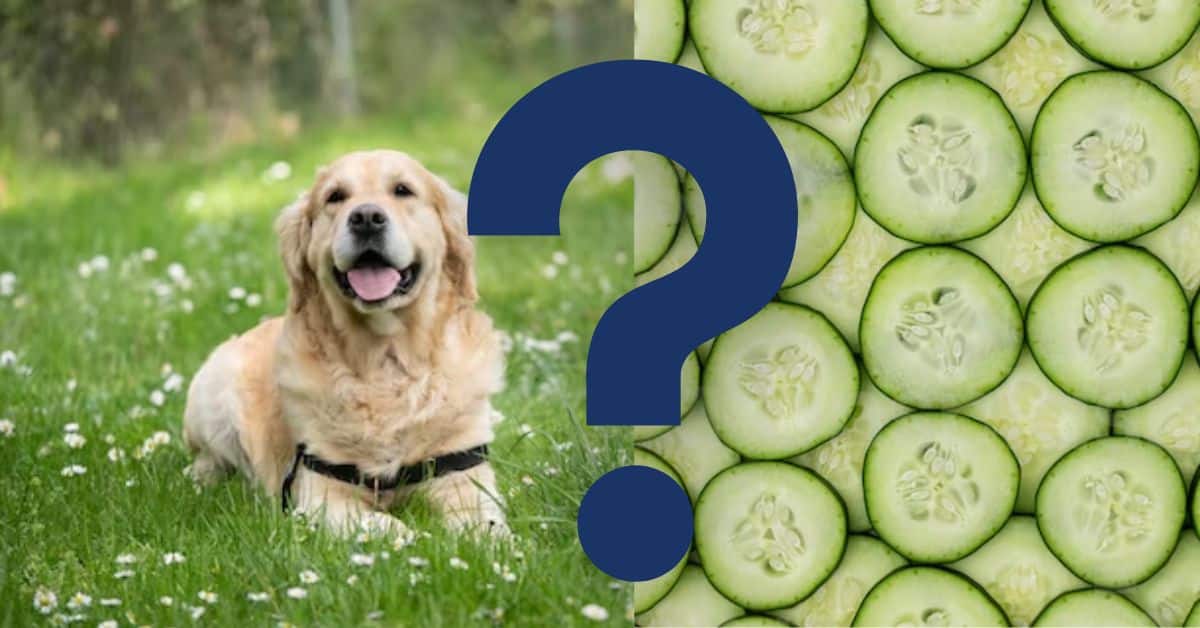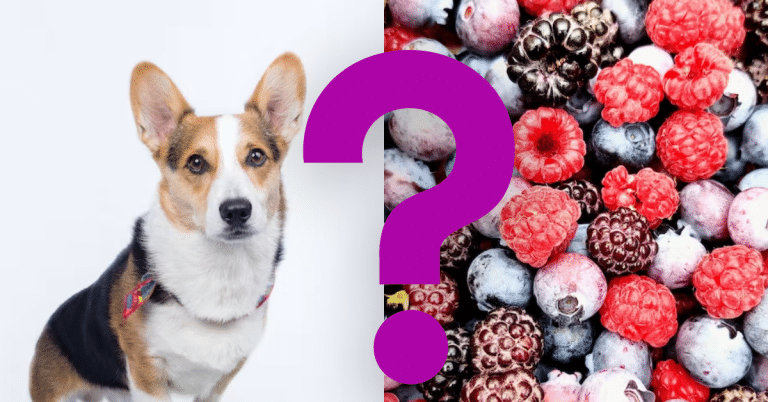Can Dogs Eat Cucumbers? A Vet’s Opinion

Cucumbers are a popular vegetable with low calories and nutrients, but can you feed Cucumbers to your dog?
In moderation, dogs can eat cucumbers. Most dogs may safely and healthily consume cucumbers, but it’s crucial to introduce them gradually and constantly observe how your dog responds.
Benefits Of Cucumbers For Dogs
Cucumbers may be a nutritious supplement to a dog’s diet when given in moderation. Here are a few possible advantages:
- Cucumbers are a fantastic source of water, as was previously noted. To keep hydrated and healthy, dogs require a lot of water, particularly in hot weather or after exercise. An excellent approach to keep your dog hydrated and avoid dehydration is with cucumbers.
- Low in calories: Cucumbers are a low-calorie snack that can help dogs lose weight or keep their weight in a healthy range. Overweight dogs are more likely to experience musculoskeletal problems, diabetes, and heart disease. Hence, providing cucumbers as a low-calorie reward rather than high-calorie snacks might be a beneficial substitution.
- Cucumbers are a fantastic source of vitamins and minerals that might be helpful to dogs. They are nutrient-rich. Cucumbers, for instance, include vitamin C, an antioxidant that promotes immune function, and vitamin K, which is necessary for blood clotting and bone health. Cucumbers also include minerals like potassium and magnesium, which are crucial for nerve and muscle function and can support normal blood pressure.
- Cucumbers can assist in naturally freshening your dog’s breath and aid with foul breath. Cucumbers’ crisp texture can aid in removing germs and plaque from your dog’s teeth and gums, leading to poor breath. Also, your dog’s mouth may benefit from better dental hygiene due to the high water content of cucumbers, which can help wash away germs.
- Cucumbers are an excellent source of nutritional fiber, which can help dogs maintain good digestive health. Constipation and other gastrointestinal problems can be avoided because of fiber’s role in maintaining a healthy digestive tract. Moreover, fiber helps lower blood sugar levels, which is advantageous for diabetic dogs.
- Cucurbitacin, one of the chemicals in cucumbers that has anti-inflammatory actions, is one such compound. Although inflammation is a normal reaction to injury or illness, it may also be detrimental and be a factor in conditions including arthritis, cancer, and heart disease. Cucumbers, for example, offer anti-inflammatory characteristics that can help reduce inflammation and improve general health when given to your dog.
- Cucumbers are low in calories, but they are very satisfying due to their high water and fiber content, which aids with weight management. Cucumbers can make your dog feel full and content without consuming too many calories. This is especially beneficial for dogs prone to overeating or weight gain.
- Promotes joint health: Silica, a mineral found in cucumbers, is crucial for connective tissue, including cartilage, tendons, and ligaments. Sufficient consumption of silica can assist in preserving joint health and staving against diseases like arthritis. Dogs with joint problems can also benefit from cucumbers’ anti-inflammatory effects.

How To Safely Give Cucumbers To Dogs?
It’s essential to feed your dog cucumbers in a secure and nutritious manner. Here are a few pieces of advice:
- Choose fresh cucumbers: Select firm, fresh, and devoid of soft patches, bruising, or mold. Choose organic cucumbers since they are less likely to be contaminated with dangerous pesticides or chemicals.
- Cucumber preparation and washing: To remove dirt or debris, thoroughly rinse the cucumber in cool water. The cucumber can then be sliced into bite-sized chunks or long, thin strips.
- Gently introduce cucumbers: Introduce cucumbers gradually and in tiny amounts if your dog has never eaten them before to prevent any negative responses or stomach trouble. Start with a little bit of cucumber and watch your dog’s reaction. You can progressively raise the dosage if they accept it well.
- Cucumbers can be given to your dog as a healthy treat or snack, but they should be kept from his regular meals. Remember that your dog’s daily calorie intake shouldn’t exceed 10% of treats.
- Don’t season or salt the cucumbers: Salt and seasoning might harm dogs, so don’t season or salt the cucumbers. Cucumbers that are plain and fresh are the healthiest.
- While giving your dog any food, even cucumbers, always keep an eye on them. To prevent choking, make sure your dog chews the cucumber well and takes out any seeds that can be dangerous.
Cucumbers may be a nutritious supplement to your dog’s diet when provided in moderation, but they shouldn’t be the only food source. For your dog’s general health and well-being, you should feed them balanced, high-quality food catered to their needs and age.
Will Cucumbers Make A Dog Sick?
Cucumbers are generally safe to feed in moderation and are not poisonous to dogs. But, after eating cucumbers, some dogs may have digestive distress or an allergic response.
If your dog has a sensitive stomach, eating cucumbers may cause them to exhibit signs like diarrhea, vomiting, or stomach pains. Moreover, some dogs can be allergic to cucumbers, which might result in signs like hives, swelling, or itching.
Introducing cucumbers gradually and in modest amounts is preferable to prevent any potential problems. If your dog exhibits any symptoms of digestive distress or an allergic response, keep a careful eye on their behavior and stop giving them cucumbers. Before introducing new foods to your dog’s diet, you should talk with your veterinarian if they have a history of allergies or digestive problems.
It’s also crucial to remember that, despite the fact that they may be a nutritious supplement to your dog’s diet, cucumbers shouldn’t replace their regular meals. For your dog’s general health and well-being, you should feed them balanced, high-quality food catered to their needs and age.

Vet’s Summary
When given in moderation, cucumbers may be a nutritious supplement to your dog’s diet. They have a low caloric intake, are nutrient-dense, and may be suitable for your health in several ways, including hydration support, digestive support, inflammation reduction, joint support, and weight control. But, it’s advisable to introduce cucumbers gradually and thoroughly observe your dog’s behavior as some dogs may develop stomach problems or an allergic reaction after consuming them.
Dogs may also benefit from probiotics. Live microorganisms called probiotics can help the gut’s bacterial population remain balanced. They can cure or prevent illnesses, including allergies, diarrhea, and irritable bowel syndrome, strengthen the immune system, reduce inflammation, and improve digestion.
A nutritious and balanced diet is the best way to support your dog’s health and well-being. Fresh, whole foods like cucumbers and probiotics can be beneficial, but it’s crucial to speak with your doctor before making any significant dietary or supplement changes for your dog.
Videos To Watch
Can your dog eat cucumbers? Watch the video below to find out:
What happens to your dog when you give them cucumbers? Then watch this video:






